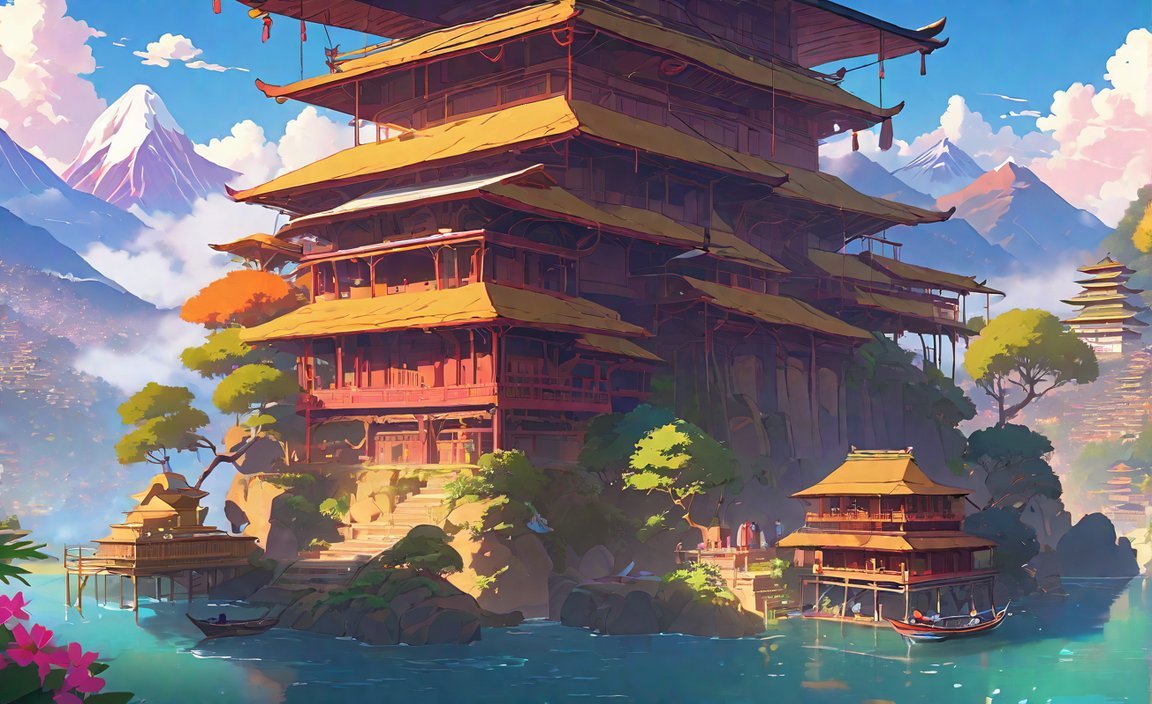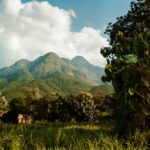Welcome to an exciting journey through the enchanting wonders and cultural treasures of Nepal! In this article titled “10 Fascinating Fun Facts of Nepal: Exploring the Wonders and Cultural Treasures,” we will embark on a captivating exploration of this mesmerizing country. Get ready to uncover hidden gems and delve into the rich tapestry of Nepal’s awe-inspiring landscapes, ancient traditions, and captivating history. Join us as we delve into the lesser-known facts that make Nepal a truly special destination. Let’s dive in and embark on this thrilling adventure together!

Key Takeaways:
- Nepal is home to 8 of the world’s 10 tallest mountains, including Mount Everest.
- Nepal is the birthplace of Buddha and used to be the only Hindu nation in the world.
- Nepal has a unique triangular flag and follows a different calendar than the rest of the world.
- Nepal is a popular destination for extreme sports and adventure tourism.
- Nepal has a diverse population that speaks 129 different languages.
- Nepal has the densest concentration of world heritage sites.
- Nepal has a population of 30 million people and covers an area of 56,827 square miles.
- Momo is the most popular fast food in Nepal.
Fun Facts of Nepal: Exploring the Wonders and Cultural Treasures
Nepal, a country nestled in the heart of the Himalayas, is a land of awe-inspiring landscapes and rich cultural heritage. As an avid traveler and experienced travel writer, I have discovered some fascinating fun facts about this enchanting country that will captivate your imagination. Join me on a journey to uncover the wonders and cultural treasures that make Nepal a truly unique destination.
1. Nepal: A Land of Highest Peaks
Did you know that Nepal is home to eight out of the ten tallest mountains in the world? Yes, you heard it right! Among them stands the mighty Mount Everest, the highest peak on Earth. Nepal’s breathtaking mountainous terrain attracts adventure enthusiasts from across the globe, offering incredible opportunities for trekking and mountaineering.
2. The Birthplace of Buddha
Nepal holds a significant place in Buddhism as it is the birthplace of Siddhartha Gautama, the founder of Buddhism, who later became known as Gautama Buddha. Lumbini, located in southern Nepal, is the sacred site where Buddha was born, making it a place of pilgrimage for Buddhists worldwide.
3. From Hindu Kingdom to Secular State
For centuries, Nepal used to be the only Hindu nation in the world. However, in 2008, it transformed into a secular state, recognizing the freedom of religion and embracing diversity. This significant shift reflects the harmonious coexistence of multiple religious beliefs and practices in Nepal.
4. The Unique Triangular Flag
Nepal stands out with its distinctive triangular flag. Unlike the traditional rectangular flags seen in most countries, Nepal’s flag is two overlapping triangles; the upper triangle represents the Himalayan Mountains, while the lower triangle symbolizes the fertile Terai region.
5. A Different Calendar
Nepal follows a unique calendar system known as the Bikram Sambat or the Nepali calendar. The Nepali New Year, also known as “Nava Barsha,” usually falls between April and May, and it is celebrated with great joy and festivity throughout the country.
6. Adventure Paradise
Are you seeking an adrenaline rush? Look no further than Nepal! This small nation is a haven for adventure enthusiasts with a plethora of extreme sports and adventure tourism activities to offer. Bungee jumping, paragliding, white-water rafting, and mountain biking are just a few examples of the thrilling experiences that await you in Nepal.
7. A Linguistic Tapestry
Nepal boasts remarkable linguistic diversity, with over 129 different languages spoken across the country. Nepali, the official language, is widely spoken, but numerous regional languages, dialects, and ethnic languages also contribute to the linguistic tapestry of Nepal.
8. A Treasure Trove of World Heritage Sites
Prepare to be amazed by the dense concentration of UNESCO World Heritage sites in Nepal. From the stunning architecture of Kathmandu Durbar Square to the ancient city of Bhaktapur, Nepal is a treasure trove of cultural, historical, and architectural wonders that will transport you back in time.
9. Vibrant Population and Breathtaking Landscapes
Nepal, with its population of approximately 30 million people, encompasses an area of 56,827 square miles. Despite its small size, the country offers a diverse range of landscapes, from snow-capped mountains to lush valleys and tropical forests, making it a paradise for nature lovers.
10. Momo Madness
Last but not least, no visit to Nepal is complete without indulging in the country’s most popular fast food: momo. These delectable dumplings, filled with various savory or sweet fillings and served with spicy sauce, have become a staple in Nepali cuisine and a favorite among locals and tourists alike.
In conclusion, Nepal is a land of wonders and cultural treasures waiting to be explored. From its towering peaks to its rich heritage, the country offers a unique experience to travelers seeking adventure, spirituality, and a glimpse into a vibrant and diverse culture. So, pack your bags and embark on an unforgettable journey to Nepal, where fun facts and unforgettable memories await you.
Here are some interesting facts about different countries:
- Fun Fact About Sweden: Did you know that Sweden is known for having one of the highest life expectancies in the world? Click here to discover more fascinating facts about Sweden.
- Fun Fact About Sri Lanka: Sri Lanka is home to the world’s oldest continually planted tree, the Sri Maha Bodhi. Click here to explore more intriguing facts about Sri Lanka.
- Fun Facts About Armenia: Armenia is the country where the oldest known leather shoe was discovered, dating back to around 3500 BC. Find out more fascinating facts about Armenia by clicking here.
- Something Interesting About Honduras: Did you know that Honduras is home to the largest barrier reef in the Northern Hemisphere? Discover more intriguing facts about Honduras by clicking here.
- Fun Facts About Albania: Albania is known for having the highest number of bunkers per capita in the world. Click here to explore more fascinating facts about Albania.
Start exploring these captivating countries by clicking on the links above!
Wonders of Nepali Cuisine
Nepali cuisine is a true reflection of the country’s rich cultural heritage and diverse geography. Influenced by ethnicity, geography, and neighboring regions, Nepali cuisine offers a wide array of flavors and dishes that are sure to tantalize your taste buds. In this article, we will explore the wonders of Nepali cuisine and uncover some fascinating facts about its unique flavors and traditional dishes.
Dal-Bhat-Tarkari: A Traditional Meal
One of the most iconic and widely consumed dishes in Nepal is the traditional meal known as dal-bhat-tarkari. This meal consists of three main components: dal (lentil soup), bhat (rice), and tarkari (curried vegetables). It is eaten twice daily by the Khas people and is considered a staple in Nepali households. The combination of lentils, rice, and vegetables provides a balanced and nutritious meal that fuels the locals throughout the day.
Influence of Western Culture
While traditional Nepali cuisine is deeply rooted in local flavors and ingredients, the influence of Western culture is also evident in modern Nepali cuisine. Over the years, foods like bread, cereals, pizzas, and soft drinks have made their way into Nepali cuisine, especially in urban areas. This blend of local and Western flavors adds a unique twist to Nepali dishes and reflects the country’s evolving culinary scene.
Diverse Regional Cuisines
Nepal’s diverse geography and ethnicities contribute to the country’s wide range of regional cuisines. From the flavors of the fertile Terai plains to the spicy delicacies of the hilly regions and the hearty dishes of the mountainous areas, each region offers its own distinct culinary traditions. Exploring these regional cuisines is a treat for food enthusiasts, as it provides a deeper understanding of Nepali culture through its diverse culinary heritage.
Eating Etiquette
In Nepali villages, meals are often eaten seated on small wooden seats or chairs and benches. The locals follow certain eating etiquettes, such as using the right hand for eating and not touching the food with the left hand. Sharing meals is a common practice that fosters a sense of community and togetherness. Whether you’re dining in a local household or a restaurant, embracing the Nepali way of eating adds to the overall experience of enjoying the wonders of Nepali cuisine.
Key Takeaways:
- Nepali cuisine is influenced by ethnicity, geography, and neighboring regions.
- The traditional meal, dal-bhat-tarkari, is a staple in Nepali households, consisting of lentil soup, rice, and curried vegetables.
- The influence of Western culture has introduced new elements to Nepali cuisine, such as bread, cereals, pizzas, and soft drinks.
- Nepal’s diverse regional cuisines offer a wide variety of flavors and dishes.
- Eating etiquette in Nepal emphasizes the use of the right hand and sharing meals as a community.
Sources:
[^1^]: Nepalese cuisine – Wikipedia
[^2^]: A Guide To The Dishes and Food Of Nepal | Culture Trip
Quirky Festivals and Celebrations in Nepal
Nepal is a vibrant country with a rich cultural heritage, and its festivals are a window into the traditions and beliefs of its people. Here are some of the most quirky festivals and celebrations in Nepal that showcase the country’s unique culture:
1. Yak Attack: The World’s Highest Mountain Biking Race
- Yak Attack is an exhilarating mountain biking race that takes place in the Himalayas, offering participants a thrilling adventure at high altitudes.
- It is not just a race but also an opportunity to soak in the breathtaking landscapes of Nepal while challenging the limits of physical endurance.
- Bikers from around the world come to Nepal to participate in this one-of-a-kind event, making it a true celebration of adventure and determination.
2. Baby-Tossing Festival: Bisket Jatra
- Bisket Jatra, celebrated in Bhaktapur during the Nepali New Year, features the unique tradition of baby-tossing.
- During the festival, a statue of the deity Bhairab is placed on a chariot and pulled through the city by the residents.
- At a certain point, the chariots clash, and people compete to catch the statue and toss it into their homes, symbolizing good luck.
- This extraordinary tradition is filled with excitement and is believed to bring prosperity to those who catch the statue.
3. Red Machhendranath Festival: Curious Chariot Procession
- The Red Machhendranath Festival is a grand celebration in Kathmandu that involves the procession of a massive chariot carrying the deity Machhendranath.
- The chariot, known as “Rato Machhendranath,” is pulled through the streets by devotees, with music, dance, and colorful displays accompanying the procession.
- This festival attracts a large number of locals and tourists, offering a captivating and vibrant experience.
4. Holi: Hindu Festival Of Colors
- Holi, known as the festival of colors, is celebrated with great enthusiasm in Nepal.
- During this festival, people come together to playfully throw colored powders and water at each other, symbolizing the victory of good over evil.
- It is a joyous celebration filled with laughter, music, and dancing, creating a lively and vibrant atmosphere.
5. Gai Jatra: Honoring the Deceased
- Gai Jatra, also known as the “Festival of Cows,” is a unique celebration held in the Kathmandu Valley.
- During this festival, families who have lost a loved one within the past year participate in a procession, leading a cow or a young boy dressed as a cow.
- This procession is believed to help the deceased loved one’s soul to transcend to the afterlife and bring comfort to the bereaved families.
- Gai Jatra combines elements of humor and grief, making it a distinctive and touching festival.
These quirky festivals and celebrations are just a glimpse of the cultural treasures that Nepal has to offer. Each festival presents a unique opportunity to witness the country’s traditions, customs, and the lively spirit of its people.
Key Takeaways:
- Yak Attack is a thrilling mountain biking race in the Himalayas, attracting adventure enthusiasts from around the world.
- The baby-tossing tradition during Bisket Jatra symbolizes good luck and prosperity.
- The Red Machhendranath Festival showcases a grand chariot procession in Kathmandu.
- Holi is a vibrant and joyful festival where people celebrate by throwing colored powders and water at each other.
- Gai Jatra combines humor and grief to honor the deceased and bring comfort to their families.
Sources:
– Holidify – Yak Attack: The World’s Highest Mountain Biking Race
– Culture Trip – Unique Festivals in Nepal
Notable Personalities from Nepal
Nepal is not only known for its stunning landscapes and rich cultural heritage but also for the remarkable individuals who have dedicated their lives to the welfare of others and the country. These notable personalities have made significant contributions in various fields, ranging from healthcare to anti-trafficking, corruption, and energy. Let’s dive into the lives and achievements of these inspiring individuals:
1. Anuradha Koirala
Anuradha Koirala, born on April 14th, 1949, is a prominent figure who has dedicated her life to fighting against human trafficking and rescuing victims. She founded Maiti Nepal, an organization that provides shelter, rehabilitation, and support to survivors of trafficking. Koirala’s commendable work has earned her several national and international awards and recognition.
2. Sanduk Ruit
Sanduk Ruit is a renowned ophthalmologist who has made significant contributions to improving eye care in Nepal. He specializes in providing eye power treatment to poor and needy individuals who cannot afford it. Ruit co-founded the Himalayan Cataract Project, an initiative aimed at eliminating preventable and curable blindness in the Himalayan region. Through his cost-effective surgical techniques, Ruit has transformed the lives of many people.
3. Bhagawan Koirala
Bhagawan Koirala is a renowned medical professional who has made notable contributions to the field of medical science in Nepal. His expertise and dedication have greatly contributed to the advancement of healthcare in the country. Koirala’s research, publications, and involvement in various medical organizations have played a significant role in improving healthcare services.
4. Govinda K.C.
Govinda K.C. is a notable figure in the field of medicine in Nepal. He has been actively involved in fighting against corruption in the medical sector. K.C. has raised his voice against irregularities and unethical practices in medical education and healthcare. Through his activism and advocacy for reforms, he has played a pivotal role in ensuring transparency in the medical profession.
5. Kul Man Ghising
Kul Man Ghising is recognized for his contribution to the energy sector in Nepal. As the managing director of Nepal Electricity Authority, he played a key role in ending the widespread power cuts in the country. Ghising implemented effective measures to reduce electricity losses and improve the power distribution system, resulting in uninterrupted electricity supply for both rural and urban areas.
These notable personalities have faced numerous challenges in their respective fields. Anuradha Koirala has encountered threats from traffickers and societal taboos surrounding the issue of trafficking. Sanduk Ruit has worked in remote areas with limited resources and faced challenges in sustaining eye care services. Bhagawan Koirala has overcome resource constraints and collaborated with international organizations to conduct research. Govinda K.C. has faced resistance from vested interests in the medical sector and has even been arrested for his activism. Kul Man Ghising has had to navigate bureaucratic hurdles and opposition from various stakeholders to implement reforms in the energy sector.
These individuals serve as an inspiration to others, demonstrating the important role individuals can play in bringing about positive change in society. Nepal is fortunate to have such dedicated personalities who continue to make a lasting impact in their respective fields.
Key Takeaways:
- Anuradha Koirala has dedicated her life to fighting against human trafficking and rescuing victims. She founded Maiti Nepal, an organization that provides support to survivors.
- Sanduk Ruit, an ophthalmologist, has made significant contributions to improving eye care in Nepal through the Himalayan Cataract Project.
- Bhagawan Koirala is a renowned medical professional who has advanced the field of medical science in Nepal through his research and involvement in medical organizations.
- Govinda K.C. has actively fought against corruption in the medical sector and advocated for reforms in medical education and healthcare services.
- Kul Man Ghising has played a crucial role in ending power cuts in Nepal and ensuring uninterrupted electricity supply through effective measures and reforms.
Sources:

FAQ
Q1: How many of the world’s tallest mountains are located in Nepal?
A1: Nepal is home to 8 of the world’s 10 tallest mountains, including Mount Everest, the highest peak in the world.
Q2: What are some unique cultural aspects of Nepal?
A2: Nepal has a unique triangular flag and a different calendar than the rest of the world. It is also the birthplace of Buddha and used to be the only Hindu nation in the world.
Q3: Is Nepal a popular destination for adventure tourism?
A3: Yes, Nepal is a popular spot for extreme sports and adventure tourism. Activities such as bungee jumping and paragliding are available for thrill-seekers.
Q4: How many languages are spoken in Nepal?
A4: Nepal has a diverse population that speaks 129 different languages, showcasing its rich linguistic diversity.
Q5: Does Nepal have a high concentration of world heritage sites?
A5: Yes, Nepal has the densest concentration of world heritage sites, making it a treasure trove of cultural and historical landmarks.
- Star Ring Trends: Etsy vs Amazon - March 28, 2025
- Boost Pollinator Habitats: Baby Blue Eyes Sustainable Farming Guide - March 28, 2025
- Protect Big Black Bears: Effective Conservation Strategies - March 28, 2025
















